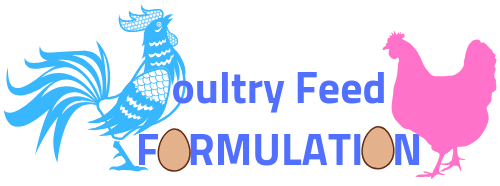Poultry feeding is the single biggest cost in poultry production. It is estimated that poultry feeds account for between 65% to 70% of the total production cost. That is a significant cost. This article will tell you on how to make your own chicken feeds and increasing your profits as a result.

To cut down on the cost of production or to be simply self-sufficient in their poultry farming enterprises, many farmers are now moving towards growing their own poultry feeds or at least formulating their own poultry feeds. There are lots of advantages associated with formulating poultry feeds on your own and you can generally take this to any level that you wish. Some farmers have grown their poultry farming enterprises to the level where they have now become poultry feeds suppliers for other poultry producers.
If you know how to make your own chicken feeds or can grow and mill your own poultry feed, you won’t have to spend money on buying poultry feeds on a regular basis and that can lead to significant cost reductions in the poultry farming enterprise.
Besides, formulating your own poultry feeds gives you greater control on the kind of nutrition that you are feeding your chickens. As a poultry feed miller, you will have an idea of the bulk ingredients used in formulating the poultry feeds as well as the composition of the poultry feeds. You won’t have to worry about the quality and composition of the poultry feeds that you are giving your chickens.
Poultry feed formulation is also great for farmers who would wish to avoid using certain ingredients such as the genetically modified corn and soya.
The main challenge when it comes to making your own poultry feed is knowing the right kinds of ingredients to use in the poultry feeds and adding these in the right proportions. There is a concept called least cost feed formulation and this gives you plenty of options when it comes to formulating your own poultry feeds. There are numerous options for ingredients that you can use to create custom mixes for poultry feeds at the lowest prices possible.
Here is a look at some of the grains that you can use in poultry feed formulation and the proportions in which these grains should be mixed to give you optimal rations for your poultry feeds.
Ingredients to Put in Your Poultry Feeds
So what are some of the ingredients that you should use in formulating your poultry feeds? And in what proportions should these be mixed? Various poultry nutrition experts have their ideas on what the ideal poultry feed recipe should be like. There is no universal formula for making chicken feeds and in many cases, you will have to customize the poultry feed formula to suit your local geographical conditions. There are some ingredients that you can grow easily in your backyard while some you’d rather purchase. Some are cheap while others are fairly costly to acquire.
It is important to carefully study the ingredients that have been used in the commercial poultry feeds for you to get a clear idea of the main percentages that you should aim for. Birds will only grow at an optimal rate if you have the right amount of the ingredients, be they the proteins or the carbohydrates. If you are a little lower in the nutritional requirements, your feeds will still be safe for the chickens to consume but they may not grow as fast as desired.
When making your own poultry feeds, you must make sure that you strike the right balance for all the macronutrients that are required in the poultry feeds including the carbohydrates, proteins and fats and the micronutrients required in the poultry feeds such as the enzymes and vitamins. A little trial and error might be necessary before you can strike the right balance for your poultry feeds.
Below is a list of some of the ingredients that you should factor in when preparing your chicken feeds. The information that we have provided below is just a general guidelines but at the end of the day, your custom poultry feed mixes must include what is best for your needs.
Ingredients for the Main Poultry Feeds
These can include the following:-
- Alfalfa meal: This is high in protein
- Corn: This is the mainstay for poultry diet
- Field peas: This is a protein source and can be a substitute for those who don’t want to use soybean.
- Wheat
- Barley or oats: should make up less than 15% of the overall poultry diet.
Things that you should add in the poultry feed
- Feeding limestone to provide calcium
- Oyster shells
- Salt
- Grit
- Fish meal to help boost protein or omega 3s
- Cultured yeast to provide B vitamins, digestive enzymes and minerals
- Crab meal: Can provide minerals and proteins
- Probiotics
- Broad-spectrum mineral supplements
- Flaxseed: Can be a source of omega 3s
Equipment Need to Make Poultry Feeds
Check out our reviews of the various poultry feed mills that you can use in formulating your own poultry feeds. These machines include grinders, mixers and pelletizers that will help you process your poultry feed in the right format.
You should also consider constructing a storage bin where you can store your processed poultry feeds in excellent shape for a longer duration of time. We have done an article on poultry storage solutions that might help you understand the best kind of storage that you will need for your processed feeds.
Related posts:
6 MOST COMMON POULTRY DISEASES YOU CAN ELIMINATE WITH QUALITY NUTRIENTS
How to Make Poultry Feed
The Ultimate Broiler Starter Mash Recipe: Achieving Optimal Nutrition for Your Flock
4 Important Factors to Keep in Mind When it Comes to Poultry Feed Formulation
Typical Poultry Feed Formulation
Poultry Feed Formulation



I want tout stant up my own feeling mill in africa